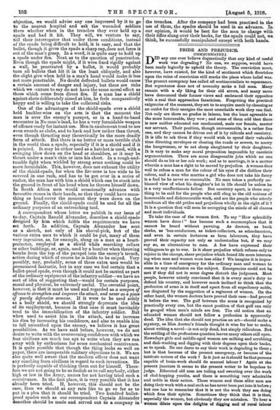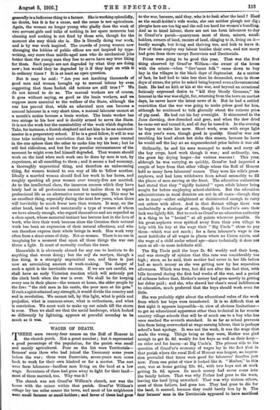PRIDE AND PREJUDICE
[COMMUNICATED.]
D' any one ever believe dogmatically that any kind of useful work was degrading ? No one, we suppose, would have been ready logically to uphold the theory. The conviction must, however, have existed, for the kind of sentiment which flourishes upon the ruins of conviction still marks the place where belief was. The present emergency has called all sentimentalists to repentance. But repentance does not of necessity make a full man. Many remain with a sly liking for their old errors, and many more have denounced their former views and embraced their opposites with a zeal that approaches fanaticism. Forgetting the practical exigencies of the moment, they set to to acquire merit by choosing as an outlet for their energies the most unsuitable work they can find. Not only are there no grades in labour, but the least agreeable is the more honourable, they vow ; and some of them add that there is now neither educated nor uneducated, male nor female, master nor servant. Their position, though unreasonable, is a rather fine one, and they cannot be driven out of it by ridicule and casuistry. It is idle to ask them if they would wish to spend their valuable time directing envelopes or clearing the roads or sewers, to marry the hangwoman, or to eat sheep slaughtered by their daughters. It is easy to make any moral proposition impossible by casuistic argumentation. There are some disagreeable jobs which no one should do as his or her sole work; and as to marriage, it is a matter wherein a man has a right to be moved by prejudice. A woman does well to refuse a man for the colour of his eyes if she dislikes their colour, and a man who marries a girl who does not take his fancy is a fool be he never so reasonable. No man takes a perfectly un- biassed view of what his daughter's lot in life should be unless he is a very unaffectionate father. But casuistry apart, is there any- thing to be said for the people who still cling to the old notions of honourable and dishonourable work, and are the people who utterly condemn all the old prides and prejudices wholly in the right of it ? It is a question that will soon be occupying the minds of all classes and most individuals. To take the case of the women first. To say " How splendidly women have done I " has become such a commonplace that it cannot be heard without yawning. As doctors, as bank clerks, as 'bus-conductors, as ticket-collectors, as schoolmasters, and even in certain instances as farm labourers, they have proved their capacity not only as understudies but, if we may say so, as alternatives to men. A few have expressed their willingness to go to war. Is it sheer prejudice which refuses only to rejoice in the change, sheer prejudice which found life more interest. ing when men and women were less alike We imagine it is impos- sible in a time of emergency for the ordinary man and woman to come to any conclusion on the subject. Emergencies could not be met if they did not in some degree disturb the judgment. Most people, however utterly convinced that it is every man's duty to defend his country, and however much inclined to think that the profession of arms is in itself and apart from all expediency noble, are disgusted by the suggestion of a regiment of women. On the other hand, the women doctors have proved their case—had proved it before the war. The gulf between the sexes is recognized by practically every one, but the exact position of that gulf can only be gauged when men's minds are free. The old notion that an educated woman should not follow a profession is apparently dead. The idea that she should not practise an art—should make a mystery, as Miss Austen's friends thought it wise for her to make, about writing a novel—is not only dead, but simply ridiculous. But the settling of the professions question leaves many others still open. Nowadays girls and middle-aged women are milking and scrubbing and dish-washing and digging with their degrees upon their backs, so to speak. No one dares to say their work is degrading to them ; but is that because of the present emergency, or because of the intrinsic nature of the work ? Is it just as it should be that persons capable of brain-work should do manual labour ? Again at the present juncture it seems to the present writer to be hopeless to judge. Educated old men are toiling and sweating over the work of clod-hopping youths, and there is something very admirable and noble in their action. These women and these elder men are doing their work with a zeal such as has never been put into it before ; but one has to remember that it is not the work they are doing which fires their spirits. Sometimes they think that it is that, especially the women, but obviously they are mistaken. To hear a woman dilate upon the delights of digging and of rural labour
generally is a ludicrous thing to a farmer. She is working splendidly, no doubt, but it is for a cause, and the cause is not agriculture. Again, the woman no longer young who gladly does the work of two servant-girls and talks of nothing in her spare momenta but cleaning and cooking is not fired by those arts, though for the moment she may think she is. She is literally doing war work, and is by war work inspired. The crowds of young women now thronging the lobbies of public offices are not inspired by type- writing, any more than middle-aged men who do mechanical jobs better than the young man they free to serve have any true liking for them. Such people are not degraded by what they are doing now ; but would they be degraded by it if they kept on with it in ordinary times ? It is at least an open question.
But it may be said : " Are you not insulting thousands of good men and women brought up to manual labour by even suggesting that these 'foolish old notions are still true ? " We do not intend to do so. The manual workers are of course, it goes without saying, as good as the brain workers, and we suppose more essential to the welfare of the State, although the war has proved that, while an educated man can become a manual labourer in a very short time, a manual labourer cannot at a month's notice become a brain worker. The brain worker has two strings to his bow and is doubly armed to serve the State. It is not the work but the unsuitability of the work which degrades. Take, for instance, a Scotch shepherd and set him to be an assistant- master in a preparatory school. If he is a good fellow, it will in war time take nothing but conviction that his work is more wanted in the one sphere than the other to make him try his best ; but he will feel ridiculous, and but for the peculiar circumstances of the moment he might even feel himself degraded. That women should work on the land when such work can be done by men is not, by experience, at all ennobling to them ; and it seems a bad economy, a thoroughly unpractical thing, and therefore an unbecoming thing, for women trained to one way of life to 'follow another. Ideally a married woman should find her work in her home, and roughly speaking all poor women over twenty-five are married. As to the intellectual class, the immense success which they have lately had in all professions cannot but incline them to regard professional life as an alternative career to marriage. This may be an excellent thing, especially during the next few years, when there will inevitably be much fewer men than women. It may, on the other hand, tend to swell unnaturally a type of women of whom we have already enough, who regard themselves and arc regarded as a class apart, whose maternal instinct has become lost in the love of work, who love their work because since the Creation their natural work has been an expression of their natural affections, and who can therefore express their whole beings in work. Men work very often from a sheer sense of duty. Not so women. There is no use in imagining for a moment that upon all these things the war can throw a light. It must of necessity confuse the issue.
Meanwhile it is obviously absurd for any one to hesitate to do anything that wants doing ; but the Bog du martyre, though a fine thing, is a strangely unpractical one, and there is just now an astonishing amount of work-making. The danger of such a spirit is the inevitable reaction. If we are not careful, we shall have an early Victorian reaction which will seriously put the clock back when the war is over. We shall be for keeping every one in their places—the woman at home, the older people by the fire: "the rich man in his castle, the poor man at his gate." If such a spirit attained any strength, it would divide the country and end in revolution. We cannot tell, by this light, what is pride and prejudice, what is common-sense, what is enthusiasm, and what is conviction. We must wait to make up our minds till the storm is over. Then we shall see that the social landscape, which looked -so differently by lightning, appears at peaceful noonday to be much as it was.































 Previous page
Previous page